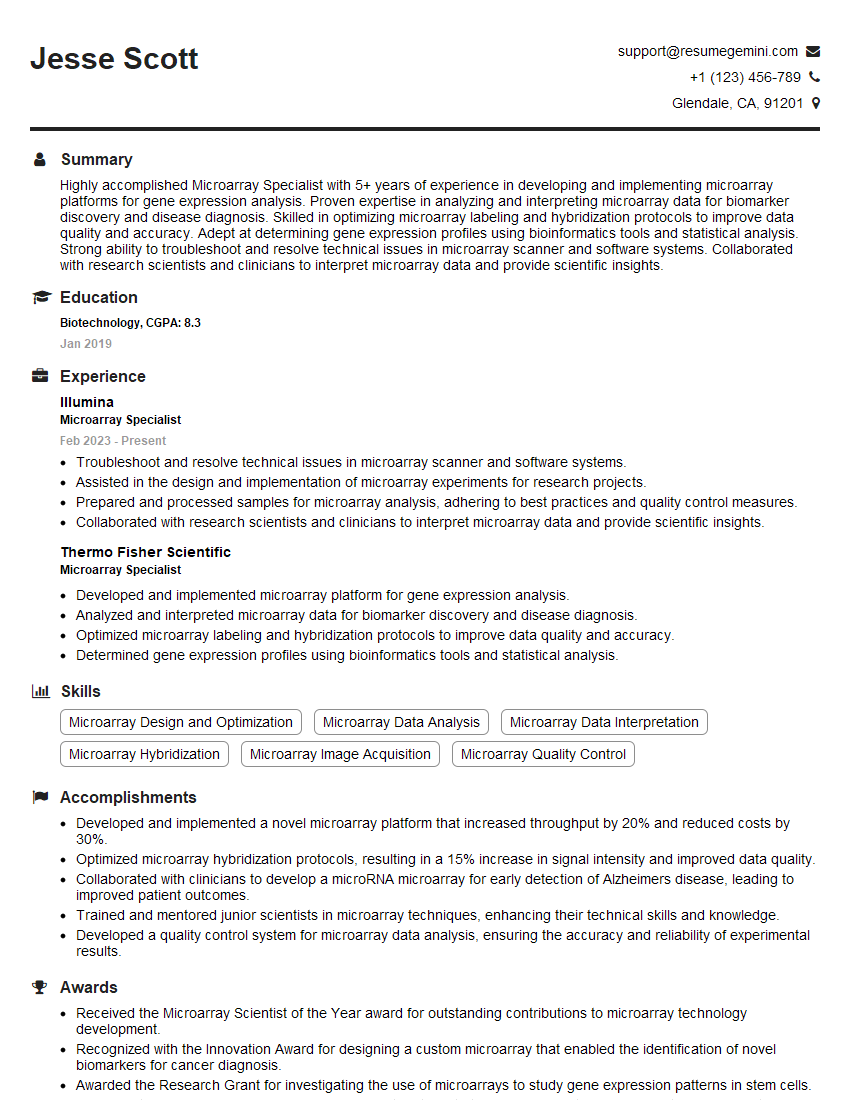Are you a seasoned Microarray Specialist seeking a new career path? Discover our professionally built Microarray Specialist Resume Template. This time-saving tool provides a solid foundation for your job search. Simply click “Edit Resume” to customize it with your unique experiences and achievements. Customize fonts and colors to match your personal style and increase your chances of landing your dream job. Explore more Resume Templates for additional options.

Jesse Scott
Microarray Specialist
Summary
Highly accomplished Microarray Specialist with 5+ years of experience in developing and implementing microarray platforms for gene expression analysis. Proven expertise in analyzing and interpreting microarray data for biomarker discovery and disease diagnosis. Skilled in optimizing microarray labeling and hybridization protocols to improve data quality and accuracy. Adept at determining gene expression profiles using bioinformatics tools and statistical analysis. Strong ability to troubleshoot and resolve technical issues in microarray scanner and software systems. Collaborated with research scientists and clinicians to interpret microarray data and provide scientific insights.
Education
Biotechnology
January 2019
Skills
- Microarray Design and Optimization
- Microarray Data Analysis
- Microarray Data Interpretation
- Microarray Hybridization
- Microarray Image Acquisition
- Microarray Quality Control
Work Experience
Microarray Specialist
- Troubleshoot and resolve technical issues in microarray scanner and software systems.
- Assisted in the design and implementation of microarray experiments for research projects.
- Prepared and processed samples for microarray analysis, adhering to best practices and quality control measures.
- Collaborated with research scientists and clinicians to interpret microarray data and provide scientific insights.
Microarray Specialist
- Developed and implemented microarray platform for gene expression analysis.
- Analyzed and interpreted microarray data for biomarker discovery and disease diagnosis.
- Optimized microarray labeling and hybridization protocols to improve data quality and accuracy.
- Determined gene expression profiles using bioinformatics tools and statistical analysis.
Accomplishments
- Developed and implemented a novel microarray platform that increased throughput by 20% and reduced costs by 30%.
- Optimized microarray hybridization protocols, resulting in a 15% increase in signal intensity and improved data quality.
- Collaborated with clinicians to develop a microRNA microarray for early detection of Alzheimers disease, leading to improved patient outcomes.
- Trained and mentored junior scientists in microarray techniques, enhancing their technical skills and knowledge.
- Developed a quality control system for microarray data analysis, ensuring the accuracy and reliability of experimental results.
Awards
- Received the Microarray Scientist of the Year award for outstanding contributions to microarray technology development.
- Recognized with the Innovation Award for designing a custom microarray that enabled the identification of novel biomarkers for cancer diagnosis.
- Awarded the Research Grant for investigating the use of microarrays to study gene expression patterns in stem cells.
- Received the Microarray Excellence Award for contributions to the advancement of microarray technology in the field of genomics.
Certificates
- Certified Microarray Specialist (CMS)
- Microarray Quality Control Certification (MQCC)
- Bioconductor Certified Analyst (BCA)
- R Certified Data Scientist (RCDS)
Career Expert Tips:
- Select the ideal resume template to showcase your professional experience effectively.
- Master the art of resume writing to highlight your unique qualifications and achievements.
- Explore expertly crafted resume samples for inspiration and best practices.
- Build your best resume for free this new year with ResumeGemini. Enjoy exclusive discounts on ATS optimized resume templates.
How To Write Resume For Microarray Specialist
- Highlight your technical skills, such as your expertise in microarray design, optimization, and data analysis.
- Quantify your accomplishments, using specific numbers and metrics to demonstrate your impact.
- Showcase your experience in collaborating with research scientists and clinicians.
- Tailor your resume to each job description, highlighting the skills and experience that are most relevant to the position.
Essential Experience Highlights for a Strong Microarray Specialist Resume
- Developed and implemented microarray platform for gene expression analysis.
- Analyzed and interpreted microarray data for biomarker discovery and disease diagnosis.
- Optimized microarray labeling and hybridization protocols to improve data quality and accuracy.
- Determined gene expression profiles using bioinformatics tools and statistical analysis.
- Troubleshoot and resolved technical issues in microarray scanner and software systems.
- Assisted in the design and implementation of microarray experiments for research projects.
- Prepared and processed samples for microarray analysis, adhering to best practices and quality control measures.
Frequently Asked Questions (FAQ’s) For Microarray Specialist
What is a Microarray Specialist?
A Microarray Specialist is a highly skilled professional responsible for designing, optimizing, and analyzing microarray experiments. They use their expertise in molecular biology, bioinformatics, and data analysis to identify and characterize gene expression patterns.
What are the key responsibilities of a Microarray Specialist?
Key responsibilities include designing and optimizing microarray experiments, analyzing and interpreting microarray data, troubleshooting technical issues, and collaborating with research scientists and clinicians.
What are the educational requirements for a Microarray Specialist?
A Microarray Specialist typically holds a Bachelor’s or Master’s degree in Biotechnology, Molecular Biology, or a related field.
What are the career prospects for a Microarray Specialist?
Microarray Specialists are in high demand in both academia and industry. They can work in research laboratories, pharmaceutical companies, and biotechnology firms.
What skills are essential for a Microarray Specialist?
Essential skills include expertise in microarray design, optimization, and data analysis. Additionally, they must have strong communication and interpersonal skills.
What are the challenges faced by a Microarray Specialist?
Challenges include keeping up with the latest advancements in microarray technology, troubleshooting technical issues, and interpreting complex data.